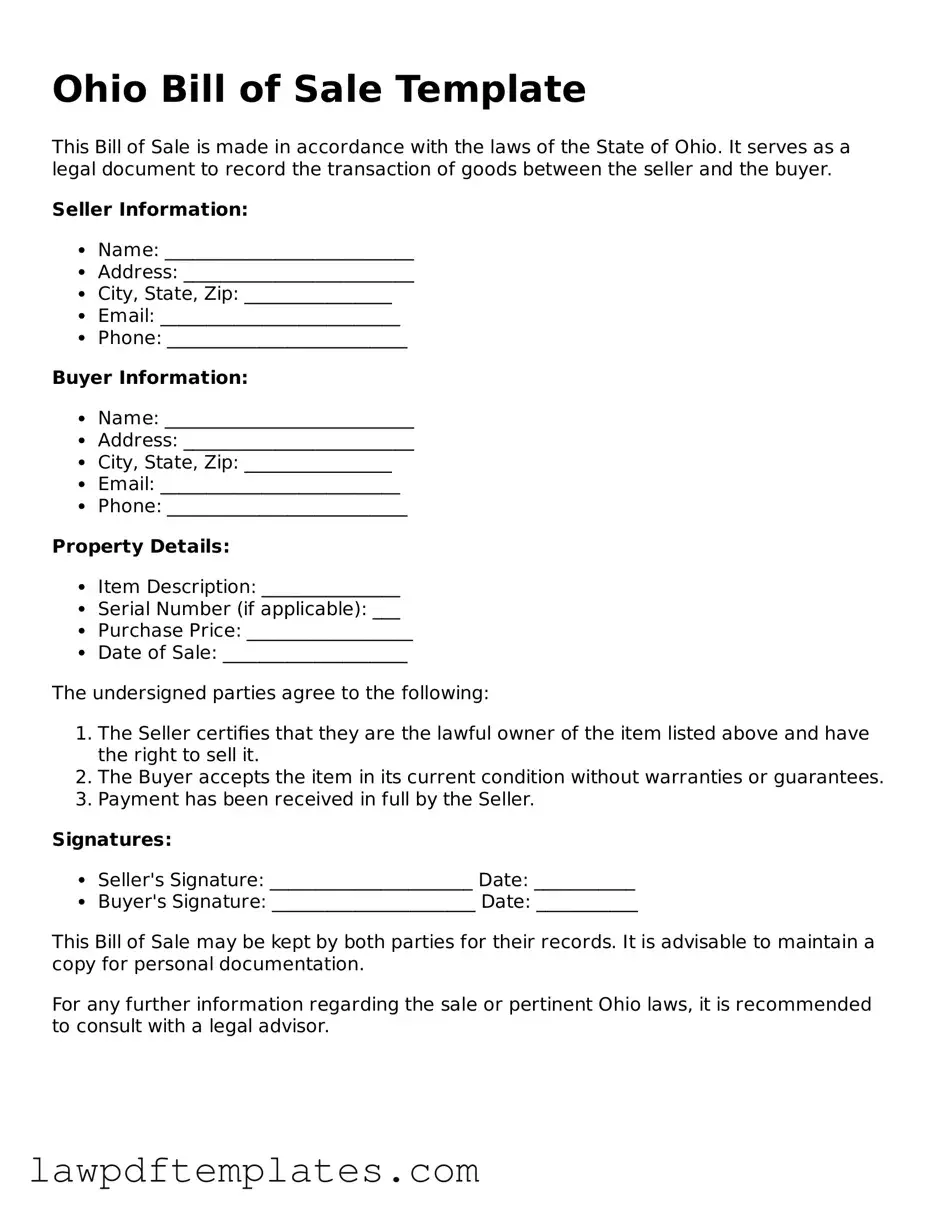Free Bill of Sale Template for the State of Ohio
Form Breakdown
| Fact Name | Details |
|---|---|
| Purpose | The Ohio Bill of Sale form serves as a legal document to transfer ownership of personal property from one party to another. |
| Governing Law | Ohio Revised Code, Section 1302.01 governs the sale of goods and related transactions. |
| Types of Property | This form can be used for various types of personal property, including vehicles, boats, and equipment. |
| Notarization | While notarization is not required, it is recommended for added legal protection and verification. |
| Seller's Information | The form must include the seller's name, address, and signature to validate the transaction. |
| Buyer's Information | Buyer's name and address are also necessary to ensure the new owner is clearly identified. |
| Property Description | A detailed description of the property being sold, including make, model, and identification numbers, should be included. |
| Purchase Price | The agreed-upon purchase price must be stated in the form to document the transaction. |
| As-Is Clause | Often, the form includes an "as-is" clause, indicating that the buyer accepts the property in its current condition. |
| Record Keeping | Both parties should keep a copy of the completed Bill of Sale for their records, as it serves as proof of the transaction. |
Sample - Ohio Bill of Sale Form
Ohio Bill of Sale Template
This Bill of Sale is made in accordance with the laws of the State of Ohio. It serves as a legal document to record the transaction of goods between the seller and the buyer.
Seller Information:
- Name: ___________________________
- Address: _________________________
- City, State, Zip: ________________
- Email: __________________________
- Phone: __________________________
Buyer Information:
- Name: ___________________________
- Address: _________________________
- City, State, Zip: ________________
- Email: __________________________
- Phone: __________________________
Property Details:
- Item Description: _______________
- Serial Number (if applicable): ___
- Purchase Price: __________________
- Date of Sale: ____________________
The undersigned parties agree to the following:
- The Seller certifies that they are the lawful owner of the item listed above and have the right to sell it.
- The Buyer accepts the item in its current condition without warranties or guarantees.
- Payment has been received in full by the Seller.
Signatures:
- Seller's Signature: ______________________ Date: ___________
- Buyer's Signature: ______________________ Date: ___________
This Bill of Sale may be kept by both parties for their records. It is advisable to maintain a copy for personal documentation.
For any further information regarding the sale or pertinent Ohio laws, it is recommended to consult with a legal advisor.
Common mistakes
When completing the Ohio Bill of Sale form, individuals often make several common mistakes that can lead to complications down the road. One frequent error is the omission of essential information. It is crucial to include all required details, such as the names and addresses of both the buyer and seller, a description of the item being sold, and the purchase price. Neglecting to provide this information can create ambiguity and may result in disputes later.
Another mistake involves inaccuracies in the item description. The Bill of Sale should clearly identify the item being sold, including any relevant details such as the make, model, year, and Vehicle Identification Number (VIN) for vehicles. Failing to provide a precise description can lead to confusion about what was actually sold, which can complicate ownership transfer.
Additionally, many people forget to sign the document. Both the buyer and seller must sign the Bill of Sale for it to be valid. Without these signatures, the form may not hold up in legal situations, and the transaction could be called into question. It is important to ensure that both parties review the document and provide their signatures before finalizing the sale.
Some individuals also overlook the importance of having a witness or notary present. While not always required, having a witness or notarization can add an extra layer of protection and legitimacy to the transaction. This can be particularly beneficial if any disputes arise in the future regarding the sale.
Lastly, individuals sometimes fail to keep copies of the completed Bill of Sale. It is essential for both the buyer and seller to retain a copy for their records. This document serves as proof of the transaction and can be vital for future reference, especially in matters related to ownership and liability. Keeping a copy ensures that both parties have access to the agreement they entered into.
Discover More Bill of Sale Templates for Specific States
Free Michigan Bill of Sale Template - Ensure the form is filled out accurately to avoid disputes later on.
When engaging in a transaction involving significant personal property, having a proper General Bill of Sale is essential. This legal document not only clarifies the details of the sale, including item description and price, but also safeguards the interests of both the buyer and seller. For those looking to streamline this process, utilizing readily available templates, such as those found at Fillable Forms, can be extremely beneficial.
California Bill of Sale - A Bill of Sale does not need to be notarized, but having a witness sign can add credibility.
